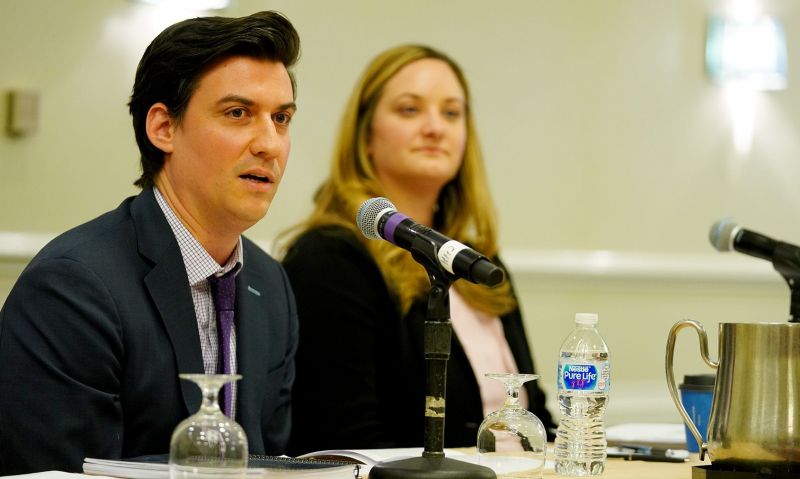
Legislative Commission hears from panel at Washington Conference.
The 90/10 loophole in the post 9/11 GI Bill that allows unscrupulous for-profit colleges to exploit veterans and taxpayers was among the topics addressed during The American Legion’s Legislative Commission meeting Feb. 25 during Washington Conference.
For-profit colleges are required to obtain at least 10 percent of revenue from a source other than Title IV education funds, the primary source of federal student aid. GI Bill funds are not considered to be under Title IV, so they count toward the 10 percent requirement, which makes them valuable to the for-profit schools.
The impact has been related to schools such as ITT Tech closing, which has made it more difficult for veterans to get the education they need.
“We need your help,” said Michael Santora, a legislative assistant for Rep. Thomas Carper, D-Del. “This loophole allows certain schools — in the words of Holly Petraeus — to target our veterans. They are seen as dollar signs in uniform. What The American Legion has been out there saying is, ‘Let’s take the dollar signs off our servicemembers’ backs. Let’s just count these funds for taxpayer dollars, which is what they are.’ This is not a partisan issue. It’s a common sense issue. What we need you to do is to ask your members of Congress to close the 90/10 loophole.”
Chris Bennett, a legislative aide for Rep. Mark Takano, D-Calif., agreed. “It undermines the value of the GI Bill. The student-veteran is unable to finish their degree, or get through the semester, because of these targeted practices. These servicemembers are not getting the same opportunities that their peers who never served are getting. That is deeply concerning.”
The panel was moderated by Lindsay Dearing, legislative associate for The American Legion’s Legislative Division. She introduced topics in the Legion’s legislative priorities ranging from health care to post-traumatic stress disorder to women veterans to VA offsets to Gold Star Families. “The American Legion is deeply troubled by the Department of Veterans Affairs’ staffing shortages within the Veterans Health Administration,” Dearing said. “As of June, VA reported 40,000 vacancies in the VHA. The American Legion understands recruiting high-quality pros is an ambitious undertaking given resources and regulatory constraints. So the question is what more can Congress do to ensure there are an adequate number of clinicians to take care of our veterans?”
Leslie Campbell, who works for Sen. Johnny Isakson, R-Ga., on the Senate Veterans Affairs Committee, praised American Legion members for helping to pass numerous veterans bills during the 115th Congress. “We could not have done it without you,” Campbell said, singling out the Mission Act.
“Part of that is the community care piece,” she continued. “The second half of the bill is about shoring up VA itself and working on recruiting and retention issues. There are some new programs looking at some rural areas, trying to get providers there. Obviously VA is a huge organization and we want to work with them on specific things. You will have some areas that really struggle to even get a physician in their clinic. Overseeing the Mission Act and making sure it is implemented correctly is important to us and we look for your guidance.”
The panel also discussed the signature wounds of the ongoing war on terrorism.
Right now, there are more than 3 million Americans who have served their nation in Iraq and Afghanistan since 2011, a number that is expected to continue to grow. Additionally, the number of Post 9/11 veterans with post-traumatic stress disorder and/or traumatic brain injuries is also expected to increase.
“We can’t employ a one-size-fits-all strategy,” said Chris Jones, a legislative staffer for Rep. Gus Bilirakis, R-Fla. “Looking to alternatives is very important. When you look at these mental health treatments it is not only difficult to diagnose, but to treat. There are a lot of things that work that don’t work in other spaces (such as) yoga therapy, acupuncture, hyperbaric oxygen and others to deal specifically with PTSD.”
Dearing noted that The American Legion’s System Worth Saving (SWS) program has been working with VA to bring women’s clinics and access up to standard. As an example of changes SWS visits have identified is that many VA clinics still need to provide a separate entrance for women veterans.
“Generally speaking, we are pleased to see the difference VA has made in this space,” Campbell said. “Obviously, there is a lot for them to still do. Women veterans are at higher risk for homelessness and suicide than their civilian counterparts. As they (VA) look at those areas as a whole, we want to make sure that they look at women veterans and how they can support women veterans who have dependents and are homeless.”
- Legislative

